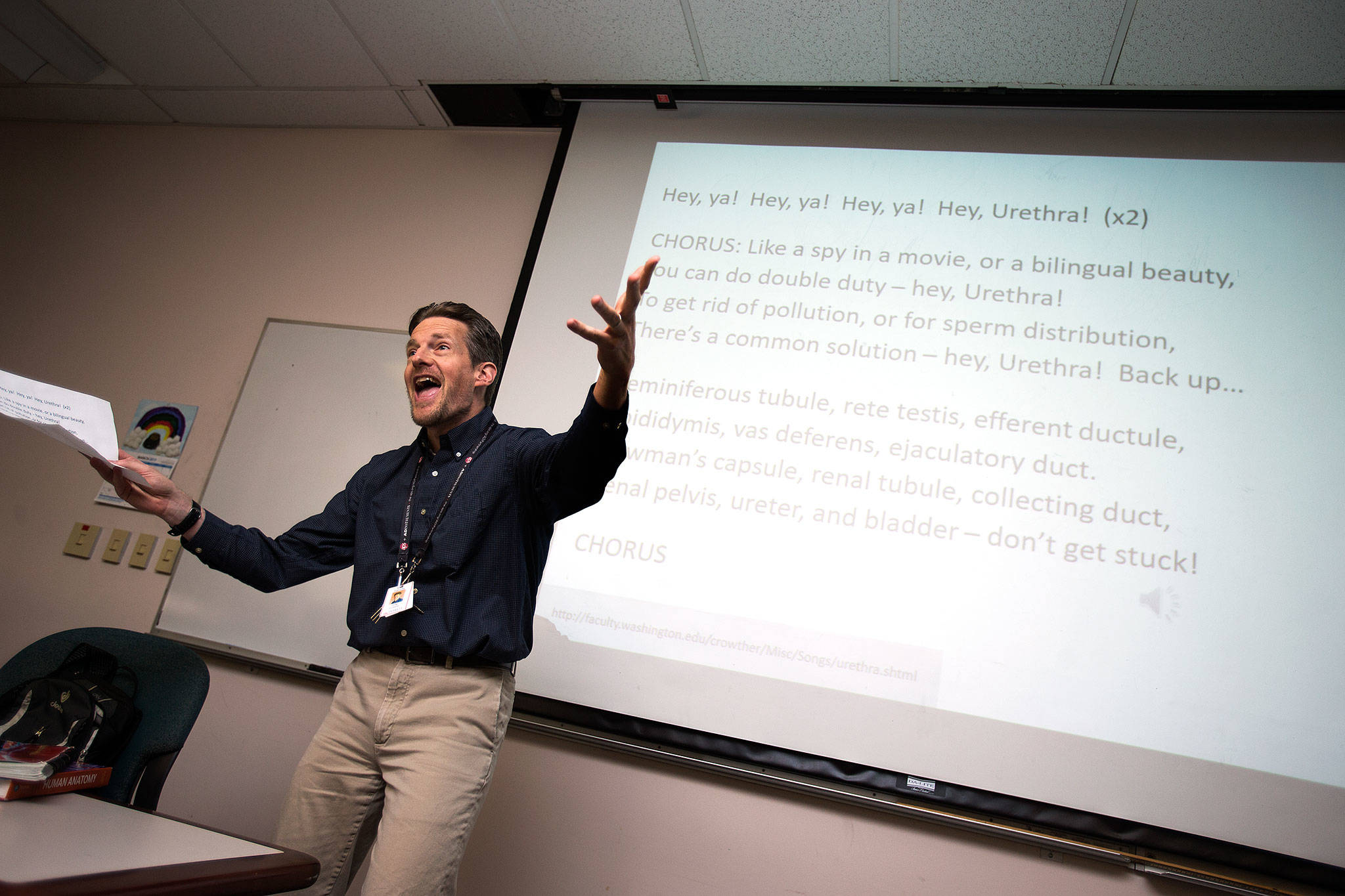He’s the Aretha of the urethra.
After a dry lecture on the workings of the urinary system, Everett Community College biology instructor Greg Crowther changes his tune.
What’s up with that?
A slideshow with musical notation replaces the series of diagrams of excretory organs.
Music blares. The button-down shirt lecturer in khakis kicks it up like a Broadway performer.
“Hey ya, hey ya, hey, urethra,” he chants.
His voice fills the room, sans microphone: “Like a spy in a movie, or a bilingual beauty. You can do double duty. To get rid of pollution, and for sperm distribution. There’s a common solution.”
Students sing the chorus: “Hey, urethra!”
They clap when the song ends.
Maybe because it is over?
Nah.
Crowther, 45, has written some 150 songs to go with his lessons. Rock, country, pop, you name it.
He repurposed a Madonna song into an immune system melody.
A parody of the The Jackson 5 hit “I Want You Back” explains how neuro electrical signals work.
A student favorite is rap song “Hypo-hypo-thalamus”: “Called pituitary by most of us. It’s the master gland, with the master plan. Telling other glands, to secrete what they can! “
Like country?
There’s “Mammas Don’t Let Your Babies Grow Up to Be Chemists.”
Each song comes with an audio file, lesson plan and study questions. It’s all on his website.
Crowther isn’t a frustrated musician. He’s a satisfied scientist.
As an undergrad, he wrote song parodies for his cross-country team to sing. Biology became the focus in grad school at the University of Washington, where he wrote “Take Me to the Liver” based on the Al Green song.
“Things mushroomed from there,” he said.
He changed the lyrics to the bubble-gum ’60s Archies tune “Sugar, Sugar” to be about glucose breakdown. A 2008 animated music video of it got more than 930,000 views.
“Glucose, ah, sugar sugar… You’re sweeter than a woman’s kiss, ‘cause I need you for glycolysis.”
Crowther taught at UW and community colleges since earning a doctorate in 2002.
“As a new teacher I was thinking of ways to try to spice class up, while cautiously throwing in some music,” he said. “Those students responded very positively.”
He spiced up the lab when he did drug development for infectious diseases at UW’s Department of Medicine. He was one hip dude in a music video to go with “Money4Drugz”: “We need money for drugs, We ain’t no thugs, But it takes more funds, To kill more bugs (parasites yo!).”
He writes most of his own music these days rather than using existing songs. “Hypo-hypo-thalamus” and “Hey, Urethra!” are both Crowther originals.
He sang “Pee Values” when interviewing for the teaching job at EvCC, and was hired a year ago. “It always distinguishes me and assures they remember me, and hopefully in a good way.”
The songs are a memory tool.
“Students often get the impression that science is a matter of memorizing a huge number of facts from their textbooks, and that is most certainly a big part of the game. There are lots of ways to do it,” Crowther said.
“Science is an emotional pursuit. At times frustrating, at times funny, at times inspiring. One way is to sing about science.”
The students are a grateful audience.
“It’s a hard class, but it makes it more interesting,” said Alicia Lillie.
“His songs are really catchy, and they get stuck in our heads,” said Kristi Sanders. “For our last exam, that’s how we remembered what the semilunar valve does in the heart.”
“We sang it in the library in the study room,” said Nicole Miller. “It helps with concepts that are hard to grasp just by looking at a book. It just brings it to life.”
Crowther’s family members offer creative input.
His oldest son Philip, 12, helped animate the “Have Yourself a Healthy Little Kidney” music video Crowther sent to his students over winter break. He and his wife, Leila, a bio-statistician, have been known to talk physiology over the dinner table.
Ben, 7 months, doesn’t get subjected to the “Cranial Nerve Functions” song with pitches corresponding to the 12 cranial nerves. Nor does 2-year-old Sam. Crowther sings the ABCs, U2 and Joni Mitchell to them.
He is modest about his talent.
“To be fair, I’m not the greatest musician,” Crowther said. “My singing is OK. It’s charming in the classroom. No one would pay $20. It’s only because they already paid their tuition and the song is free.”
Andrea Brown: abrown@heraldnet.com; 425-339-3443. Twitter @reporterbrown.
Talk to us
> Give us your news tips.
> Send us a letter to the editor.
> More Herald contact information.

























